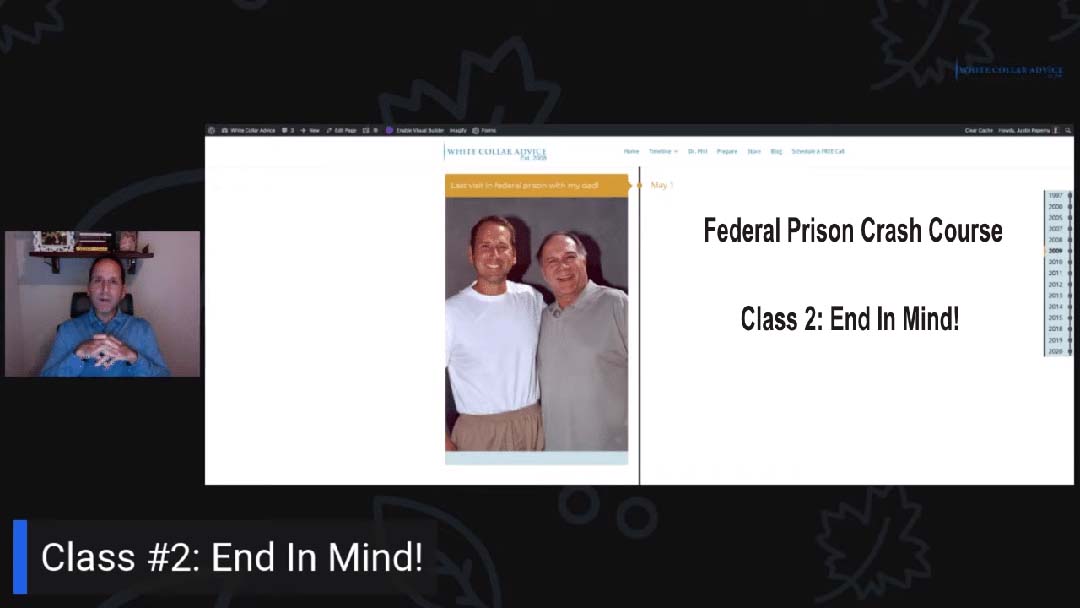In our first class, I spoke about the importance of a proactive federal prison adjustment. If you have not watched the video, do that now:
Managing a federal prison term can feel so overwhelming that many people never stop to think about their long-term success. “Somehow I will get through it,” is the common response I heard in federal prison, and still hear now.
Mastering life in prison begins with taking personal responsibility for your daily goals. You must assess and determine exactly what it is you are trying to achieve. For example, three days ago I received an email from a client in prison. This is a what proactive prison adjustment looks like:
“Justin, rocking and rolling here. Wanted to share my goals for 21. welcome your feedback.
read 3 books a month and take notes on each book
run 75 miles a month and do weights three days a week
write 10 thank you letters (snail mail) to thank my network for standing by me
in bed by 9pm, up by 6am
spend 30 minutes a day writing copy
maintain weight of 175 or less
line up two more backup jobs in the halfway house by end of March.
enjoy each day. soon i am home!!
Thanks my man!”
By writing about his goals, and sharing them with his network, he is clearly taking responsibility for his prison term–and life.
Without a clear destination in mind how will we ever know if we have gotten anywhere? Just hoping to get through your prison term is not a goal.
The end is coming whether you sleep, complain, or do productive work in prison. You cannot have peace of mind in prison if you spend your days wasting time and ruminating on the past.
Too many prisoners waste their time and mental energy. Instead of contemplating how they want to emerge, and the manner in which they want to live the remainder of their lives, they stay stuck in the prison of their own self-destructive thinking. That is not a strategy that leads to success for people who live anywhere, anytime, ever.
Let me paint the picture by contrasting two prisoners I know. In fact, one of them is a client and friend, David Applegate, who blogged through our sites while he was in federal prison.
David was a former senior executive for a health care company who served a 60-month sentence. Steve was a health care administrator who served a 60-month sentence. Both men were convicted of white-collar crimes and both were college graduates. They served their sentences very differently, however. Only one began with the end in mind.
Steve hated every day of his time inside. He tried to sleep as much of his sentence away as possible. He continuously harped on how unjust it was that he was in prison. Steve illegally purchased cigarettes ($10 for each smoke!) on the black market and smoked several each day. He’s gained weight and his combative attitude landed him in segregation twice. As a consequence of his disciplinary problems, Steve lost his eligibility for halfway house consideration. His family hardly visited him nor did he want them to.
David, on the other hand, spent his time thinking about the career challenges he would face upon release from federal prison.
He knew his felony conviction would interfere with his ability to work as a health care executive. Instead of dwelling on what he could not do, or the freedoms that he lost, David thought about steps he could take to create new career opportunities. He blogged, he wrote to his network, he read, he educated himself, he helped new prisoners, and as important, he always reflected on both his strengths and his weaknesses. He spent time each day assessing what he needed to do to emerge successfully. David is a perfect case study on how to succeed in prison with a productive attitude.
Although David understood he may not work again as an executive in his former field, he knew his knowledge of health care could lead him to a lucrative consulting career. To prepare for that type of employment, he recognized that it would help to continue to hone his knowledge.
David had an end in mind. He knew the career he wanted to pursue, and he knew that he needed to spend his time getting ready do that work well. Jail is temporary. Jail is merely a penalty box and you will get out. A successful prisoner will pivot quickly and use their time to prepare for the future.
To close, those who begin serving their federal prison sentences with the end in mind, like David, lead more successful adjustments. It is that simple!
Best,
Justin

